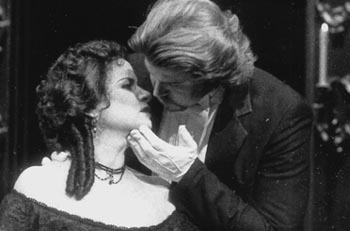![[Metroactive Stage]](/stage/gifs/stage468.gif)
[ Stage Index | San Jose | Metroactive Central | Archives ]
She's Fallen and Can't Get Up: Barbara Divis and Tomas Truhitte in 'La Traviata'
Varying Verdi
Period-piece miscues undercut social context of Opera San Jose's 'La Traviata'
By Scott MacClelland
EVEN WHEN Alexandre Dumas' aristocratic Parisian society lets its hair down, it never allows itself to be seen as tawdry. Opera San Jose's production of La Traviata introduces a seaminess that undermines the tragic character of Violetta Valéry and a calculation that turns Giorgio Germont into an unsavory voyeur.
These inflections come not from the Piave scenario used by Verdi but from the stagecraft of director Lorna Haywood (whose career includes many leading soprano roles in opera houses on both sides of the Atlantic). While she makes the most possible use of John Rathman's set (which hems in the tiny Montgomery Theater stage even more), Haywood uses costumes that tarnish the vanities of Second Empire social culture.
Allowing that culture to be seen drunk and disorderly, to cavort in drag or lift ladies' skirts, gives the impression that Violetta enjoys a safe haven. Dumas' "lady of the camellias," however, is most vulnerable exactly because contemporary social hypocrisy is unforgiving. Why, otherwise, does Alfredo's invitation to escape from Paris sound so appealing? Though her "honor" is briefly defended according to protocol, Violetta is dropped like a hot rock in the wake of the Germont scandal.
Moreover, by his stiffness, Giorgio Germont--initially the righteously indignant father--appears to harbor a prurient interest in his son's lover. Having driven Violetta from Alfredo, he finds various excuses to haunt her himself. His "timely" appearances are in the script of course, but slapping his son at the Act II party is not. Suddenly he behaves as if he were Violetta's lover, like the other rival, Baron Douphol.
Even when it goes to mawkish lengths, Verdi's music defines and argues the irony of Violetta's situation. Likewise, the singing by the three principals and the orchestra under conductor David Rohrbaugh successfully counter the staging's fin de siècle miscues.
On opening night, vocally solid characterizations were given by Barbara Divis as Violetta, Thomas Truhitte as Alfredo and Constantinos Yiannoudes as Germont (the main roles are double cast). Rohrbaugh maintained careful attention to the singers in their solo and dramatic moments, and secured good quality playing from his 26 musicians. (Concertmaster Cynthia Baehr broke hearts with her simpering Act III solos.)
For all the magnitude of her voice and sophistication of her character, Divis effectively conveys Violetta's vulnerability. That she does this without chewing the scenery (all of it close enough in to break off a piece) is a tribute to her sense of scale and theatrical restraint. Her coloratura nailed the high notes while her low register growled like a great cat.
Truhitte, who brings matinee-idol looks to the stage, supported his outbursts of naive passion and impetuous fury with a ringing tenor, phrased and punctuated in traditional Verdian style. His unrefined physicality ran counter to the culture of Violetta--but within the parameters of the part. He showed off an impressive sotto voce during Violetta's death scene.
Despite his stiff formality, Yiannoudes produced a commanding baritone that filled the room. His measured phrasing, however, worked against sympathy, in giving as well as receiving.
Accomplished performances were given by Patrice Houston as Flora, Monica Barnes as Annina, Joseph Wright as Douphol, Adam Flowers as Gastone and the briefly exposed Paul Thompson as Dr. Grenvil. Overall, this is a worthy La Traviata that once again underscores the achievements of Opera San Jose's training program and, forced by the physical limitations of the Montgomery, gives the audience an appealing intimacy rarely if ever experienced in the major opera houses.
[ San Jose | Metroactive Central | Archives ]
Copyright © 2000 Metro Publishing Inc. Metroactive is affiliated with the Boulevards Network.
For more information about the San Jose/Silicon Valley area, visit sanjose.com.
![]()

Photograph by Pat Kirk
La Traviata plays April 20-22, 25, 27, 29 and May 5 at 8pm and April 23, 30 and May 7 at 3pm at Market and San Carlos streets, San Jose. Tickets are $35-$50. (408.437.4450)
From the April 20-26, 2000 issue of Metro, Silicon Valley's Weekly Newspaper.